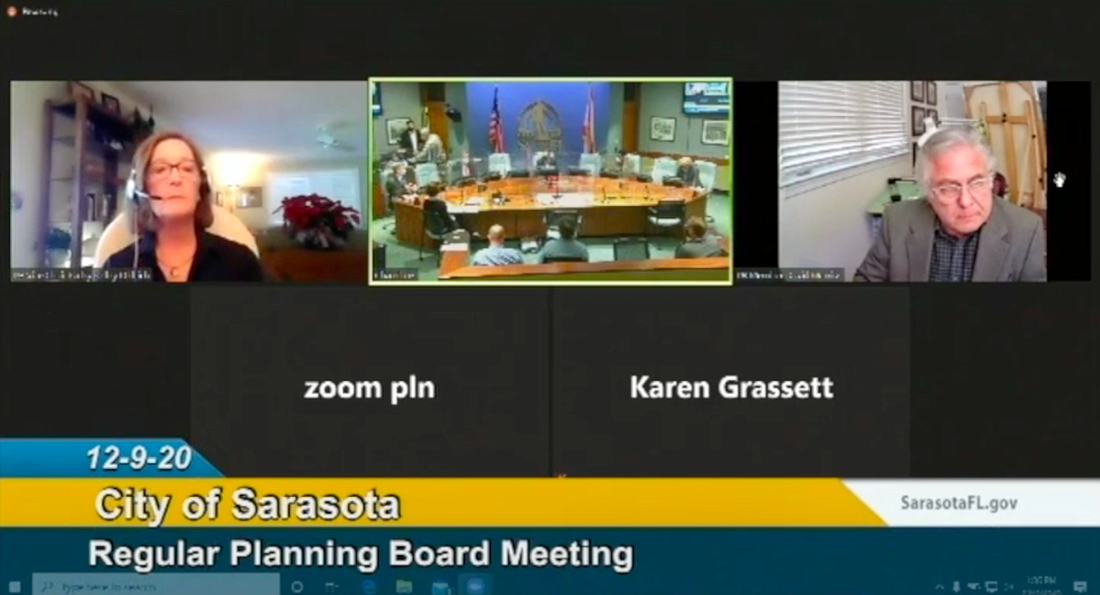- April 25, 2024
-
-
Loading

Loading

On Dec. 9, the city of Sarasota’s Planning Board was scheduled to review a proposal to redevelop the Bath and Racquet Club property. The plan was a revised version of a project that previously sparked controversy — a 2019 Planning Board public hearing on an earlier application lasted more than three hours.
This time around, the Planning Board never got to the Bath and Racquet Club proposal. And for the immediate future, it’s uncertain whether the board will be able to hold another three-hour hearing on any development application filed with the city.
During the Dec. 9 meeting, three board members — Kathy Kelley Ohlrich, David Morriss and Patrick Gannon — said they were not willing to meet in-person for longer than two hours because of concerns related to COVID-19. As a result, the five-member board could not maintain a quorum. The board postponed two hearings, including the Bath and Racquet Club application, until January.
Board Chairman Damien Blumetti said he had received calls ahead of the meeting expressing frustration about the disruption to the city’s development review process. Although the Planning Board is an advisory body with members appointed by the City Commission, it is required to provide recommendations on certain applications and, in some cases, has decision-making authority.
Blumetti said he didn’t think the board could mitigate the restriction by meeting more frequently.
“Solving this issue by having a bunch of special meetings to review one particular application is not conducive to city staff, the other board members, the applicants,” Blumetti said. “We need to figure this out, how to move forward as a board. We can’t hold up the planning process.”
The board members responsible for the time restriction said they had objections to lengthy, in-person meetings. They noted that COVID-19 positivity rates were higher in Sarasota County now than they were in the summer, when Gov. Ron DeSantis had an executive order in place allowing boards to meet remotely. That order expired in November.
Board member Patrick Gannon said he was only comfortable with shorter meetings because transmission risk increases the longer space is shared with an infected person. Planning Board meetings routinely exceed four hours and, in 2020, have lasted more than seven on two occasions. Gannon also said it was harder to guarantee mask compliance from the public at meetings than it was with board members and staff.
Board member Kathy Kelley Ohlrich pointed out that while the City Commission had access to rapid COVID-19 tests ahead of its meetings, Planning Board members were not entitled to that measure. Ohlrich and Morriss said anyone unhappy with their unwillingness to participate in longer in-person meetings should register their displeasure with DeSantis’s office.
“I suggest the people who are anxious to have their applications heard by the board contact the governor and get him to reinstitute the Zoom meetings,” Ohlrich said. “I think it’s unconscionable that volunteer advisory board members should be expected to jeopardize their own health.”
Deputy City Attorney Mike Connolly ran down state regulations that require the Planning Board to have at least a majority of its members present in-person to hold meetings. The state has also established timelines for reviewing development proposals: Within 180 days of accepting a complete application, a municipality must decide whether to approve or deny it.
“That’s the world we must live in,” Connolly said.
Toward the end of the board’s discussion, Gannon suggested rotating board members every two hours, ensuring there are always at least three members present in-person even though the specific individuals are changing. Connolly said the board could do that legally, though the city would need to sort out the logistics.
Absent another plan that could facilitate longer meetings, Blumetti said he thought the City Commission would need to provide guidance.
“Something needs to be done,” Blumetti said.